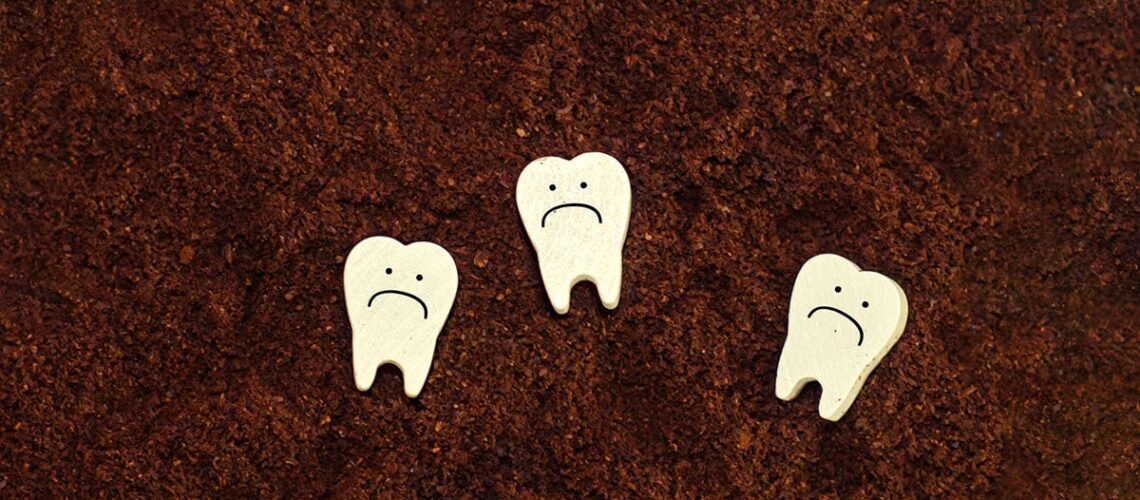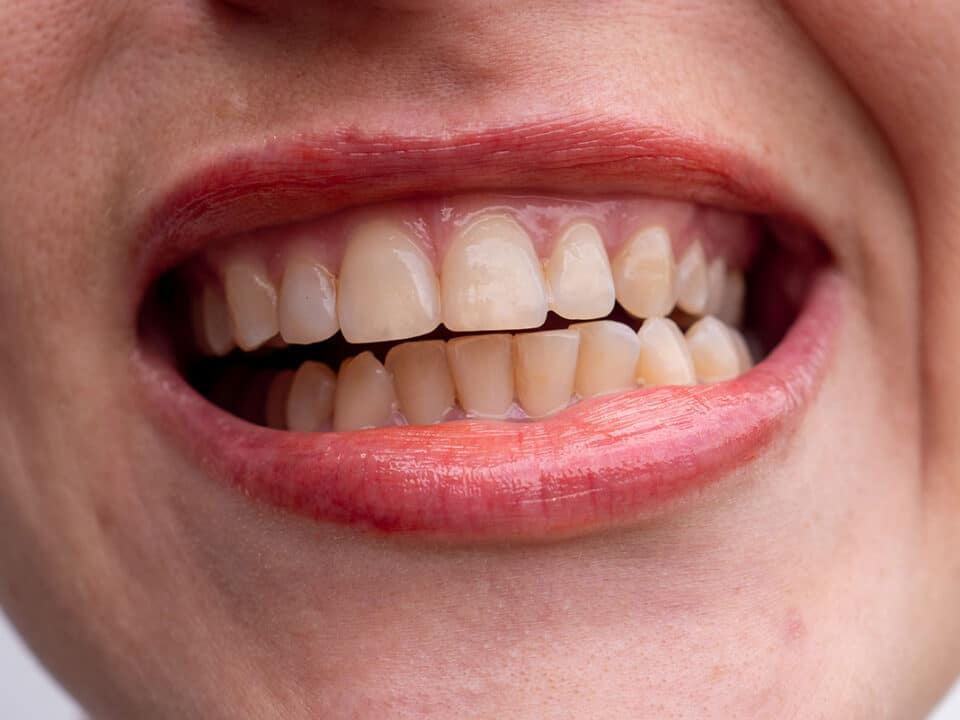Are you noticing your teeth becoming more sensitive or looking worn down? You might be dealing with dental erosion causes and prevention—a topic crucial for anyone aiming to enhance their oral health.
Dental erosion occurs when acids dissolve your enamel, often due to acidic foods (like soda), lifestyle habits (like brushing too soon), or medical conditions (like acid reflux). To prevent it, limit acidic foods, rinse your mouth after eating, and use fluoride toothpaste. This issue affects people of all ages, with studies showing that up to 45% of children and 80% of adults in the U.S. experience some form of erosive tooth wear.
The good news? You can take control! In this article, we’ll dive into the main causes of dental erosion, from acidic foods causing dental erosion to GERD, and share practical prevention tips for dental erosion. You’ll learn how to protect your enamel with diet changes, oral hygiene practices, and professional care. We’ll also provide a visual guide to enamel-safe habits, quick takeaways, and answers to common questions. Ready to safeguard your smile naturally? Let’s get started!
Table of Contents
What Is Dental Erosion and Why Should You Care?
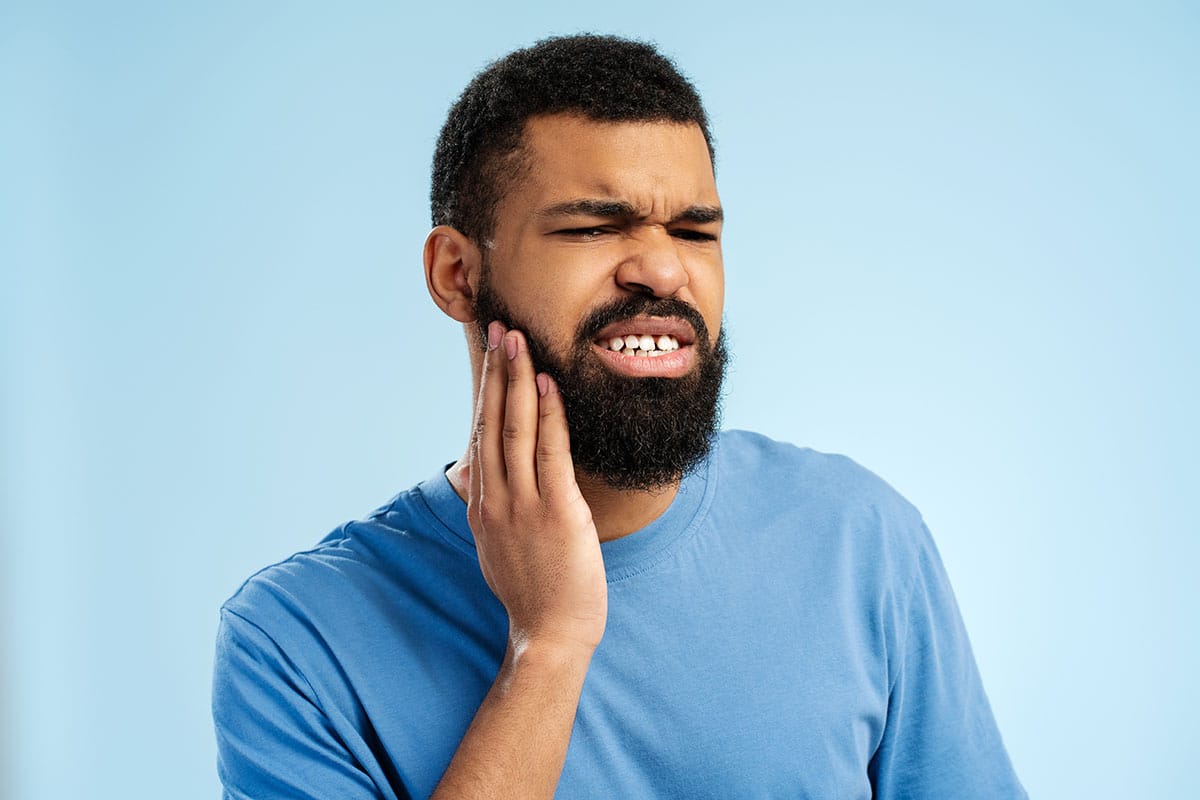
Understanding Dental Erosion
Dental erosion, also known as erosive tooth wear, occurs when acids dissolve the enamel on your teeth. Enamel is the hard, protective outer layer that shields your teeth from decay and damage. Unlike tooth decay, which is caused by bacteria, dental erosion is a chemical process driven by acid exposure. Once enamel erodes, it doesn’t grow back, making prevention critical. A 2015 meta-analysis found that 34.1% of children and adolescents worldwide experience dental erosion, while in the U.S., up to 80% of adults show signs of erosive tooth wear (American Dental Association, 2021). This isn’t just a cosmetic issue—it can lead to serious oral health problems if ignored.
Erosion starts when acids lower the pH in your mouth below 5.5, softening the enamel. Over time, repeated acid exposure wears away the enamel, exposing the softer dentin underneath. This can make your teeth look yellow, rounded, or even translucent at the edges. For readers of any age, understanding dental erosion causes and prevention is the first step to keeping your smile healthy. Whether you’re a teen sipping soda or a parent managing your child’s diet, knowing what causes erosion helps you take action early.
The Impact on Your Oral Health
The effects of dental erosion go beyond appearance. As the enamel wears away, you might notice increased sensitivity to hot, cold, or sweet foods. This happens because the dentin, which contains tiny tubes leading to the tooth’s nerve, becomes exposed. Over time, erosion can weaken your teeth, making them more prone to chipping or cracking. In severe cases, it can lead to tooth loss, which can be psychologically traumatic and functionally limiting, especially for older adults.
Erosion also increases your risk of cavities. Without enamel’s protective barrier, bacteria can more easily penetrate the tooth, leading to decay. The Canadian Dental Association notes that erosion can exacerbate oral health issues, like gum disease, by making your teeth more vulnerable to plaque buildup. For children dental erosion in children can affect developing teeth, leading to long-term complications. For adults, it can mean costly restorative treatments like fillings or crowns. By focusing on prevention tips for dental erosion, you can avoid these issues and maintain a strong, healthy smile for life.
Dentist Insight: Many people overlook the emotional toll of dental erosion. A worn-down smile can affect self-esteem, especially for teens or young adults who are already self-conscious about their appearance. Addressing erosion early protects your teeth and boosts your confidence, helping you smile freely in social and professional settings.
Common Causes of Dental Erosion
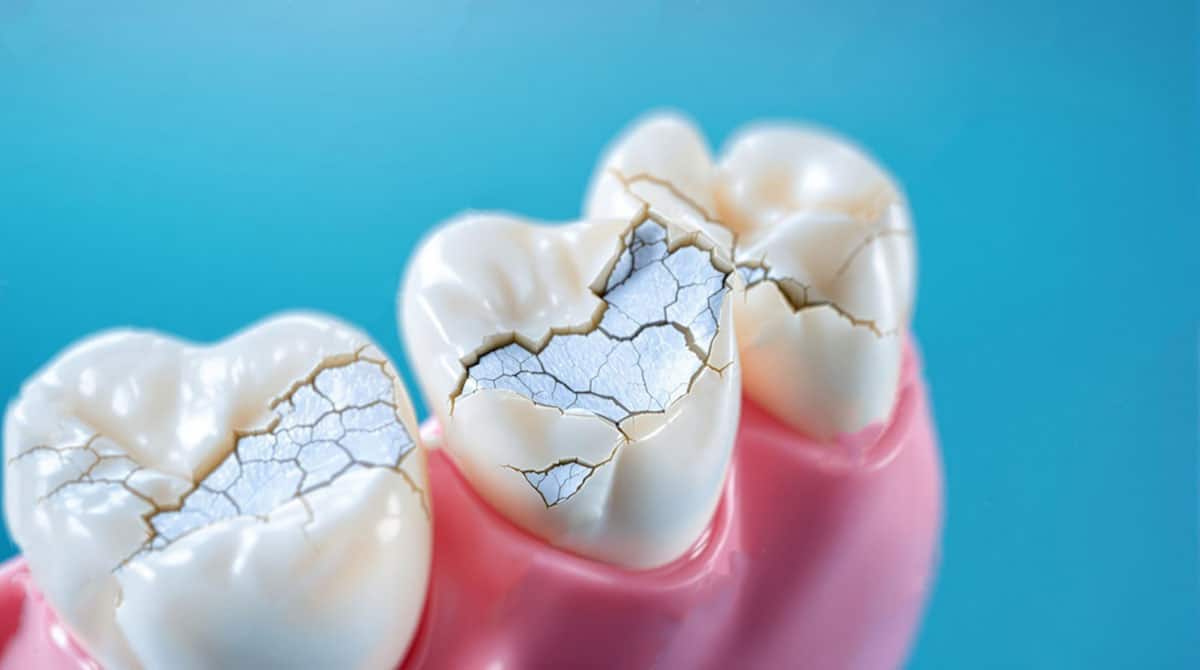
Acidic Foods and Drinks
Key Causes: One of the primary dental erosion causes is frequent exposure to acidic foods and drinks. These include:
- Soda and Sports Drinks: pH as low as 2.5.
- Citrus Fruits: Lemons, oranges (pH 3–4).
- Fruit Juices: Often acidic with added sugars.
- Wine and Vinegar: Low pH erodes enamel.
- Dried Fruits: Sticky and acidic, prolonging exposure.
A study highlighted that soft drinks and fruit juices are often perceived as the most acidic beverages, with a pH as low as 2.5—well below the 5.5 threshold where enamel starts to dissolve (BMC Oral Health, 2022). For example, a can of soda can soften enamel within 20 minutes of consumption, making your teeth vulnerable to further damage.
Acidic foods don’t just come from obvious sources. Hidden culprits like salad dressings (often vinegar-based), wine, and even some “healthy” snacks like dried fruits can contribute. Dried fruits, while nutritious, are sticky and acidic, clinging to your teeth and prolonging acid exposure. For readers trying to enhance their oral health, being mindful of acidic foods causing dental erosion is key. You don’t have to eliminate these foods entirely, but moderation and smart habits (like rinsing your mouth after eating) can make a big difference.
Lifestyle Habits That Harm Enamel
Your daily habits play a huge role in dental erosion. Some common habits to avoid include:
- Brushing Too Soon: Brushing right after acidic foods scrubs away softened enamel.
- Hard Brushing: Using a hard-bristled toothbrush wears down enamel.
- Swishing Acidic Drinks: Prolongs acid exposure.
- Frequent Snacking: Keeps your mouth acidic without recovery time.
Brushing too hard or using a hard-bristled toothbrush can wear down the enamel, especially if you brush right after consuming acidic foods or drinks. The enamel is softened by acid for about 20–30 minutes, and brushing during this time can scrub away the softened layer. Swishing acidic drinks in your mouth or sipping them slowly over time also increases exposure, as does frequent snacking on acidic foods without giving your saliva time to neutralize the acid.
Medical Conditions Contributing to Erosion
Medical Causes:
- Acid Reflux (GERD): Stomach acid erodes enamel.
- Eating Disorders: Frequent vomiting exposes teeth to acid.
- Dry Mouth Conditions: Reduces saliva’s protective effect.
Certain medical conditions can increase your risk of dental erosion. Acid reflux, or gastroesophageal reflux disease (GERD), allows stomach acid to enter your mouth, eroding enamel over time. GERD affects about 20% of adults in North America, and its impact on dental health is significant, as stomach acid with a pH as low as 1–2 can rapidly dissolve enamel (Canadian Dental Association, 2017). Eating disorders like bulimia, which involve frequent vomiting, also expose teeth to stomach acid. A systematic review found that individuals with eating disorders have a 5–7 times higher risk of dental erosion due to self-induced vomiting (Health Canada, 2023).
For children and teens, dental erosion from acid reflux can be particularly damaging to developing teeth. Adults with these conditions may notice erosion on the inner surfaces of their front teeth, a pattern often spotted by dentists first. Addressing these underlying conditions with medical care, alongside prevention tips for dental erosion, can help mitigate the damage.
Dentist’s Insight: Many people don’t realize stress can indirectly contribute to dental erosion. Stress often leads to habits like teeth grinding (bruxism), which wears down enamel, or increased snacking on acidic comfort foods. Managing stress through mindfulness or exercise can be an unexpected but effective way to protect your teeth.
How Acidic Foods and Drinks Affect Your Teeth

The Science of Acid Erosion
Acidic foods and drinks erode enamel through a chemical process. When the pH in your mouth drops below 5.5, enamel begins to demineralize, losing minerals like calcium and phosphate. This happens because acids (from foods, drinks, or stomach acid) dissolve the hydroxyapatite crystals that makeup the enamel. A study found that soda can lower your mouth’s pH to 2.5, softening enamel within minutes (BMC Oral Health, 2022). If this happens frequently, the enamel doesn’t have time to remineralize, leading to permanent loss.
Saliva is crucial in neutralizing acids and remineralizing enamel, but constant acid exposure overwhelms this natural defence. For example, sipping a sports drink over an hour keeps your mouth acidic, compared to drinking it quickly and rinsing afterward. Understanding the effects of soda on dental erosion is especially important for teens and young adults, who often consume these drinks regularly. Over time, this can lead to sensitivity, yellowing, and even structural damage to your teeth.
Top Culprits to Watch Out For
Common Acidic Foods and Drinks:
- Soda and Sports Drinks: pH 2.5, softens enamel in 20 minutes.
- Citrus Fruits: Lemons, oranges (pH 3–4).
- Fruit Juices: Orange, apple juice (pH 3–4).
- Wine and Vinegar: pH 3–4, erodes enamel with frequent use.
- Dried Fruits: Sticky, acidic, prolongs exposure.
Not all acidic foods are obvious. For readers trying to enhance their oral health, being aware of acidic foods causing dental erosion helps you make smarter choices. You don’t need to avoid these foods entirely—balance is key. For example, pair citrus fruits with a meal to reduce their impact, and rinse your mouth afterward to neutralize the acid.
Dentist’s Insight: Timing matters more than you think. Eating acidic foods at the end of a meal, rather than as a standalone snack, can reduce erosion risk. The other foods in your meal help buffer the acid, and your saliva production is already active, speeding up neutralization.
Lifestyle Factors That Increase Dental Erosion Risk

Brushing Habits and Timing
Your brushing habits can either protect or harm your enamel. Some key tips include:
- Wait to Brush: Wait 30 minutes after acidic foods.
- Use Soft Bristles: Avoid hard-bristled toothbrushes.
- Gentle Technique: Use small, circular motions.
Brushing too hard or using a hard-bristled toothbrush can physically wear down the enamel, especially if you brush right after consuming acidic foods or drinks. Acid softens enamel for 20–30 minutes, and brushing during this window can scrub away the softened layer, accelerating erosion. The American Dental Association recommends waiting at least 30 minutes after acid exposure before brushing (ADA, 2023).
Using the right technique is also key. Brush gently with a soft-bristled toothbrush, using small, circular motions. Angle the bristles toward your gumline to clean between teeth and gums without scrubbing too hard. For readers of all ages, adopting the best oral hygiene for dental erosion—like using fluoride toothpaste and brushing twice daily—can make a big difference. Fluoride strengthens enamel, helping it resist acid attacks.
Dry Mouth and Saliva Production
Saliva is your mouth’s natural defence against dental erosion. It neutralizes acids, washes away food particles, and delivers minerals to remineralize enamel. However, dry mouth (xerostomia) reduces saliva production, leaving your teeth vulnerable. Some common causes of dry mouth include:
- Dehydration: Not drinking enough water.
- Medications: Antihistamines, antidepressants.
- Lifestyle: Smoking, excessive alcohol.
Dry mouth can be caused by dehydration, certain medications (like antihistamines), or lifestyle habits like smoking or excessive alcohol consumption. Chronic alcoholism, affecting 10% of adults in Western countries, often leads to dry mouth and increased erosion risk (American Dental Association, 2021). Stay hydrated by drinking plenty of water throughout the day to combat dry mouth. Chewing sugar-free gum can also stimulate saliva production, as can eating crunchy foods like celery or apples. For readers looking for natural remedies for dental erosion, boosting saliva flow is a simple yet effective strategy. If dry mouth persists, talk to your dentist—they may recommend saliva substitutes or other treatments.
Dentist’s Insight: Your sleep habits might be affecting your saliva production. Mouth breathing at night, often due to nasal congestion or sleep apnea, can dry out your mouth, increasing erosion risk. Using a humidifier or addressing breathing issues with a doctor can help protect your teeth while you sleep.
Medical Conditions Linked to Dental Erosion
Acid Reflux and GERD
Acid reflux, or gastroesophageal reflux disease (GERD), is a major cause of dental erosion. GERD allows stomach acid to flow back into your mouth, eroding enamel over time. About 20% of adults in the U.S. have GERD, and its impact on dental health is significant (American Dental Association, 2021). The acid from your stomach has a pH of 1–2, far below the 5.5 threshold for enamel erosion. Over time, this can lead to noticeable wear, especially on the inner surfaces of your front teeth.
Managing GERD is key for readers dealing with dental erosion from acid reflux. Tips to Manage GERD:
- Avoid Triggers: Spicy, fatty foods.
- Eat Smaller Meals: Reduces reflux risk.
- Stay Upright: Don’t lie down after eating.
If you experience frequent heartburn, talk to your doctor—they may recommend medications like antacids or proton pump inhibitors. Rinsing your mouth with water or fluoride mouthwash after a reflux episode can also help neutralize the acid and protect your enamel.
Eating Disorders and Vomiting
Eating disorders like bulimia, which involve frequent vomiting, expose your teeth to stomach acid, leading to severe erosion. A systematic review found that individuals with eating disorders have a 5–7 times higher risk of dental erosion due to self-induced vomiting (American Dental Association, 2021). The prevalence of bulimia is around 5% among women aged 18–35 in Western countries, and over 90% of those with bulimia show signs of erosion, often on the inner surfaces of their front teeth.
For readers struggling with dental erosion and eating disorders, seeking professional help for the underlying condition is crucial. In the meantime, rinse your mouth with water or milk after vomiting to neutralize the acid—don’t brush right away, as this can worsen the damage. Using a fluoride mouthwash can also help strengthen your enamel. For parents of teens, being aware of these signs can help you support your child’s oral and overall health.
Dnetist’s Insight: Emotional support can help manage erosion from eating disorders. Joining a support group or talking to a therapist can help address the root cause, reduce vomiting episodes, and protect your teeth from further damage.
Prevention Tips for Dental Erosion
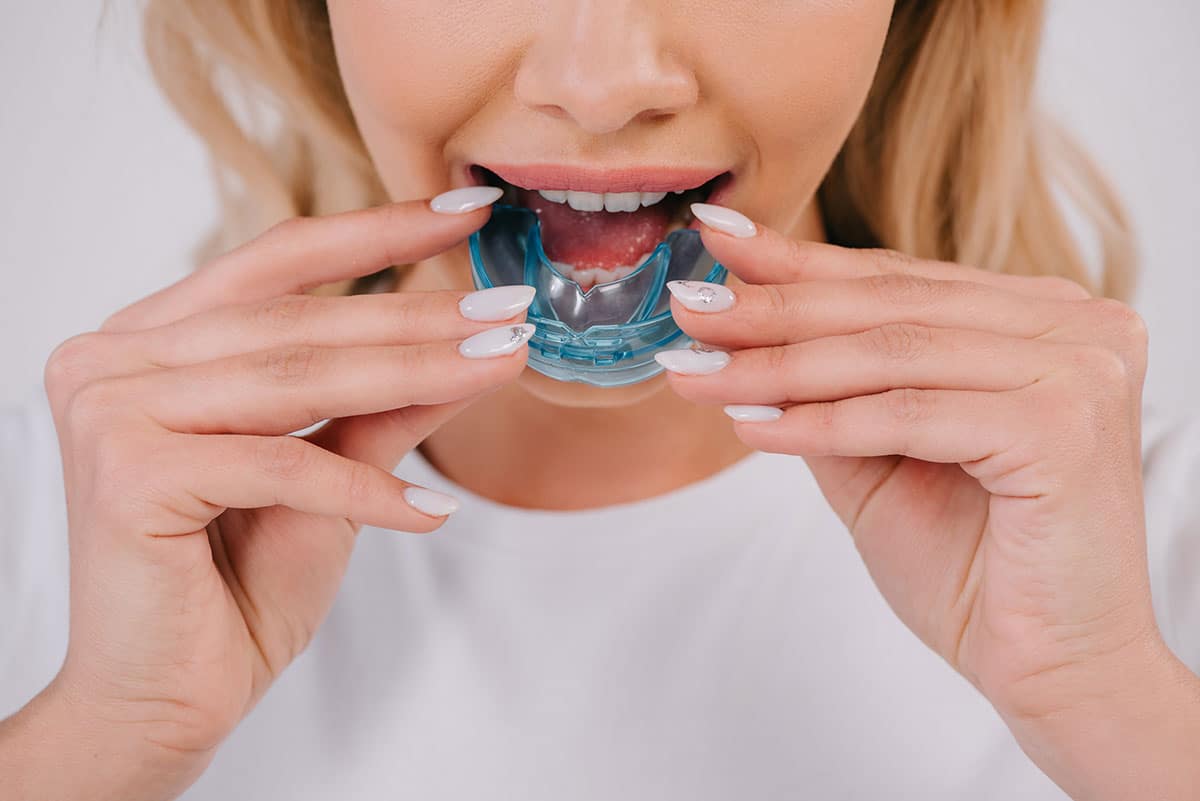
Dietary Changes to Protect Your Enamel
Your diet is a powerful tool for preventing dental erosion. Key dietary tips include:
- Limit Acidic Foods: Soda, citrus fruits, and wine.
- Use a Straw: Minimizes contact with teeth.
- Rinse After Eating: Neutralizes acid.
- Eat Enamel-Friendly Foods: Cheese, yogurt, and celery.
Incorporate enamel-friendly foods into your diet. Dairy products like cheese and yogurt are rich in calcium, strengthening enamel. A serving of yogurt provides 300 mg of calcium, meeting nearly a third of your daily needs (Health Canada, 2023). Crunchy veggies like celery and carrots stimulate saliva production, helping neutralize acids. For readers of all ages, these prevention tips for dental erosion are easy to adopt—swap soda for milk or water and snack on cheese instead of candy.
Oral Hygiene Practices to Adopt
Good oral hygiene is essential for protecting tooth enamel from erosion. Some best practices include:
- Brush Twice Daily: Use fluoride toothpaste.
- Wait to Brush: 30 minutes after acidic foods.
- Floss Daily: Removes plaque and food particles.
- Chew Sugar-Free Gum: Boosts saliva production.
Brush twice daily with fluoride toothpaste—fluoride strengthens enamel, making it more acid-resistant. Use a soft-bristled toothbrush and gentle circular motions to avoid wearing down enamel. Wait at least 30 minutes after consuming acidic foods or drinks before brushing, as your enamel is temporarily softened. Flossing daily removes plaque and food particles that can trap acids against your teeth. Chewing sugar-free gum after meals can also help by stimulating saliva production. For children, parents can encourage these habits early to prevent dental erosion in children. For adults, fluoride mouthwash can provide an extra layer of protection, especially if you’re prone to dry mouth or acid reflux.
Professional Dental Care Solutions
Regular dental checkups are crucial for preventing and managing dental erosion. Professional Solutions we offer include:
- Fluoride Varnish: Strengthens enamel.
- Dental Sealants: Protect vulnerable areas.
- Restorative Treatments: Bonding, crowns for severe cases.
Your dentist can spot early signs of erosion, like shallow defects or dentin exposure, and recommend treatments to stop its progression. For example, they might apply fluoride varnish to strengthen your enamel or suggest dental sealants to protect vulnerable areas. In severe cases, restorative treatments like bonding or crowns can repair damaged teeth. For readers with conditions like GERD or bulimia, your dentist can work with your doctor to manage the underlying issue while protecting your teeth. The Canadian Dental Association recommends biannual checkups to catch erosion early (CDA, 2017). By combining professional care with daily habits, you can effectively prevent dental erosion and keep your smile healthy for years to come.
Dentist’s Insight: Your dentist can also recommend custom mouthguards if you grind your teeth at night—a habit that exacerbates erosion by wearing down already-weakened enamel. This proactive step can save your teeth from further damage, especially if you’re under stress.
Quick Takeaways: Key Points on Dental Erosion
- Dental erosion is the loss of enamel due to acid exposure, affecting up to 80% of adults.
- Acidic foods and drinks like soda and citrus fruits are major dental erosion causes.
- Lifestyle habits like brushing too soon after acid exposure can worsen erosion.
- Medical conditions such as dental erosion from acid reflux increase your risk.
- Prevention includes limiting acidic foods, using a straw, and waiting to brush.
- Oral hygiene practices like flossing and using fluoride toothpaste help protect tooth enamel from erosion.
- Regular dental checkups can catch erosion early and provide protective treatments.
Conclusion: Take Charge of Your Oral Health Today
Dental erosion doesn’t have to steal your smile. By understanding dental erosion causes and prevention, you can take simple steps to protect your enamel and enhance your oral health. Acidic foods like soda and citrus fruits, lifestyle habits like brushing too soon, and medical conditions like GERD are common culprits—but they’re manageable. Limit acidic foods, use a straw, and rinse your mouth after eating to reduce exposure. Adopt the best oral hygiene for dental erosion practices, like brushing with fluoride toothpaste and flossing daily, to strengthen your enamel. Regular dental checkups can catch erosion early, ensuring your smile stays strong for years.
For readers of all ages, these prevention tips for dental erosion are easy to integrate into your daily routine. Whether you’re a teen sipping sports drinks or a parent helping your child avoid dental erosion in children, small changes make a big difference. Start today by swapping one acidic drink for water or adding an enamel-friendly snack like cheese to your diet. Your teeth will thank you with less sensitivity and a brighter smile. Ready to take charge of your oral health?
References
- Canadian Dental Association. “The State of Oral Health in Canada.” (2017). https://www.cda-adc.ca/stateoforalhealth/
- Health Canada. “Nutrient Values of Foods.” (2023). https://www.canada.ca/en/health-canada/services/food-nutrition/healthy-eating/nutrient-data.html
- Health Canada. “Oral Health.” (2023). https://www.canada.ca/en/health-canada/services/healthy-living/oral-health.html
- BMC Oral Health. “Awareness and Knowledge of Dental Erosion.” (2022). https://bmcoralhealth.biomedcentral.com
- National Institute of Dental and Craniofacial Research. “Oral Hygiene.” (2023). https://www.nidcr.nih.gov/health-info/oral-hygiene
- Healthdirect Australia. “Dental Erosion.” https://www.healthdirect.gov.au/dental-erosion
- PubMed. “Prevention of Progression of Dental Erosion.” (1996). https://pubmed.ncbi.nlm.nih.gov/8930590
- American Dental Association. “Dental Erosion.” (2021). https://www.ada.org/resources/ada-library/oral-health-topics/dental-erosion
Check us out on Facebook and Twitter for daily information about Oral Health from Martindale Dental, or visit our offices in Hamilton and St. Catharines.
Have more questions?
Please contact us for all inquiries or to book an appointment with one of our convenient clinic locations. We look forward to hearing from you.

